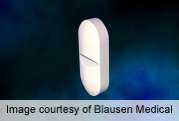ACR: TNF inhibitors linked to reduced risk of ACS in RA

(HealthDay)—For patients with rheumatoid arthritis (RA), tumor necrosis factor inhibitor (TNFi) treatment correlates with reductions in the risk of acute coronary syndromes (ACS) and myocardial infarction (MI), according to two studies presented at the annual meeting of the American College of Rheumatology, held from Oct. 25 to 30 in San Diego.
Lotta Ljung, M.D., from Umeå University in Sweden, and colleagues examined the risk of ACS in RA patients treated with TNFi (7,704 patients) versus bio-naive RA patients (23,112 patients) and the general population (38,520 individuals). The researchers found that, for TNFi versus bio-naive RA patients, the hazard ratios for ACS with short term exposure, actively on TNFi, and ever exposure were 0.78, 0.73, and 0.82, respectively. The corresponding hazard ratios were 2.27, 2.10, and 2.03 comparing bio-naive RA patients with the general population and 1.65, 1.50, and 1.61 comparing TNFi with the general population.
Audrey S.L. Low, M.B.Ch.B., from the University of Manchester in the United Kingdom, and colleagues compared the risk of MI among RA patients treated with TNFi (11,200 patients) and a biologic-nave comparator group receiving non-biologic disease modifying anti-rheumatic drugs (nbDMARDs; 3,058 patients). The researchers found that the propensity-adjusted hazard ratio of MI was 0.61 in TNFi treated patients compared with nbDMARD-treated patients.
"Treatment of active rheumatoid arthritis with anti-TNF therapy may lead not just to an improvement in joint symptoms, but also a reduction in the rate of myocardial infarctions in the medium term," a coauthor of the Low study said in a statement.
Authors from both studies disclosed financial ties to the pharmaceutical industry.
More information:
Abstract - Ljung
Abstract - Low
More Information
Copyright © 2013 HealthDay. All rights reserved.


















